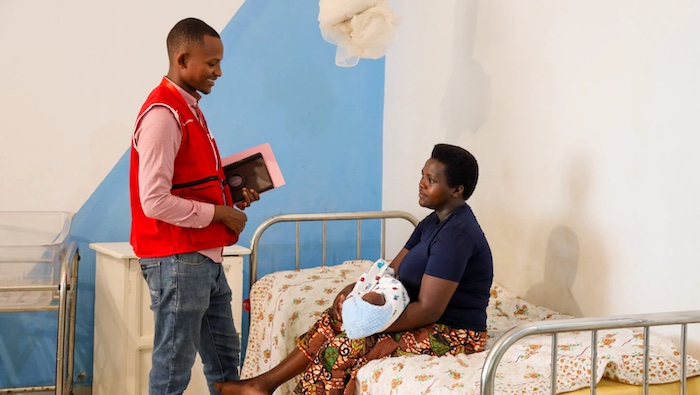
Patrick Mazimpaka, a midwife working for Save the Children, takes Florence through the birth registration process for her new baby
Florence is still trying to decide on a name for her new-born baby boy, who is less than 12 hours old. She is excited to introduce him to his four siblings at home in Mahama refugee camp and is sure they will also have opinions regarding his name. One thing though that she doesn’t have to worry about, is his birth registration.
Patrick Mazimpaka, Florence’s midwife, who works for Save the Children – the organization whom UNHCR partners with to deliver health care in Mahama camp – explains that birth registration takes a matter of minutes.
“When the mother gives birth, before we discharge her from the clinic, we enter the baby into the Civil Registration and Vital Statistics (CRVS) system. Here we add all the details of the baby and parents, the time of birth, the location of birth, and lots of other information. After we submit these details, the mother will receive an SMS with an application number through which she can get the birth certificate.”
Refugees in Rwanda are included within the digital national Civil Registration and Vital Statistics (CRVS) system that was introduced in August 2020, making it easy for parents and health professionals to secure documentation for newborns. So far in 2023, all newborn refugee babies have been registered, not only in Mahama camp but across all five refugee camps in Rwanda.
Florence explains that since she fled Burundi in 2015, UNHCR and partners supported all three of her children who were born in Mahama refugee camp to get registered. The birth registration process, though, has improved a lot since she first arrived.
“Now it is very easy for us because once we leave the health centre after registration, we proceed to collect our child’s birth certificate at Prison Fellowship Rwanda. It’s not challenging at all, we get the birth certificate immediately and we make copies of it. It’s easier than before because we used to register and wait for a long time to get the birth certificate.”
Each birth record costs a total of 2,000 RWF to print and download from the national Irembo e-Government system which has digitalized many of Rwanda’s public services.
UNHCR, through funding from EU humanitarian aid, works with Prison Fellowship Rwanda to ensure that refugees have access to civil registration services, including birth registration.
Dick Mugabo and Adronis Niyizontunga are two Burundian refugees who assist in providing these digital services. “For us it is simple as we know how to navigate the system, but not everyone does, so we are here to support other refugees in the camp access Irembo. We have over 100 new mothers coming here every month to get a birth record,” Dick explains.
At Prison Fellowship Rwanda’s centre in the camp, Gaudence is also waiting to update some details about her four-month year old baby, Bonne Chance.
“When I got the birth certificate, it incorrectly stated that my child was a girl when, in fact, he is a boy. I went to UNHCR to register him as part of my family but needed to update the birth certificate first. This is why I am here today.”
Once Gaudence explains the situation to Epa Byiringiro, one of Prison Fellowship’s staff members at the community centre, they are quickly able to rectify the situation.
For both Gaudence and Florence, they leave with a birth certificate in hand, feeling reassured that their children are set up for whatever they choose to do in the future. With proof of their legal identity, they will be able to exercise rights and access services within Mahama camp and beyond. (End)
